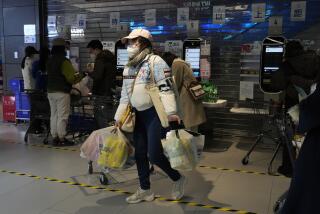Apple halts iPhone 4S release in China stores after near-riot
Reporting from Beijing â Apple Inc. halted the release of its iPhone 4S at retail stores in Beijing and Shanghai on Friday after a riot almost started outside one of its stores in the Chinese capital.
An angry mob of people who had waited overnight pelted the store with eggs and assaulted a mall manager after employees refused to open as scheduled.
Carolyn Wu, an Apple spokeswoman in Beijing, said the companyâs five authorized stores in China had sold out of the iPhone 4S and that the Beijing store was prevented from opening because of the large crowd.
âTo ensure the safety of our customers and employees, [the] iPhone will not be available in our retail stores in Beijing and Shanghai for the time being,â Wu said.
The phone is still available online through its service provider, China Unicom, which is offering the device for free provided users commit to multi-year contracts. But the crowds that lined up at Apple stores were not interested in cellphone plans, and were willing to pay $790 to $1,070 for the device alone.
People started converging Thursday outside the Apple store in one of Beijingâs most popular high-end malls. Some brought sleeping bags. Tension grew overnight and through the early morning as prospective buyers sought positions near the front door. Fights broke out between bands of migrant workers who had been hired by scalpers to purchase the phones for later sale on the gray market.
âNinety percent of the people here are scalpers,â said a man surnamed Jin, who said friends recruited him to stand in line.
The incident underscores the popularity of the Apple brand in China, which has one of the worldâs fastest-growing markets for mobile phones and personal computers.
The Cupertino, Calif.-based company said in October that sales in China rose to $13 billion, from $3 billion, for the fiscal year ending Sept. 24. Plans are afoot to make the iPhoneâs digital assistant, Siri, fluent in Chinese.
Appleâs five official stores in China -- three in Shanghai and two in Beijing -- generate more revenue on average than any other Apple stores in the world, the company said last year.
Many upwardly mobile urbanites wouldnât be caught dead without an iPhone. In June, a 17-year-old high school student reportedly sold a kidney to buy an iPad 2. And in September, a 16-year-old girl was killed in a fight with her mother over the right to buy an Apple computer.
The scene Friday was not the first time an Apple release had caused a public disturbance. The same Beijing store had its glass door shattered in May after a scuffle between a scalper and an employee during the launch of the iPad 2 and white iPhone 4.
Bill Bishop, a Beijing-based technology consultant, said the mobs were a result of Apple delaying products and limiting supplies to create a frenzy of demand.
âItâs a conscious marketing strategy by Apple, and itâs going to cause a problem because things are ridiculously out of control,â he said. âNobody can be happy with Apple today in Beijing.â
Because the stores limit customersâ purchases, scalpers organize large groups to swarm product releases, hoping to resell the products at a cut above retail.
Buyers were reportedly recruited to line up at the Shanghai store Friday as well, with promises of a free breakfast and $15.
Even when a major release is not impending, flocks of men hawking iPhones and iPads have become a regular sight outside Chinaâs authorized Apple retailers. Scalpers made up much of the crowd Friday in Beijing. The eclectic group included seniors from the countryside seeking their fortunes as well as high-school dropouts looking to make some quick cash. Some said that they had organized on Internet forums designed for temporary-job seekers.
One member of the crowd, a film extra from Beijing, said he was offered about $20 to wait overnight for the phone. He said scalpers picked up hundreds like him in buses outside film studios where extras commonly work.
âAfter Apple said they were not selling the iPhones today, no organizers paid their temporary workers,â said the man, who declined to give his name.
One man wearing a puffy red jacket said he had organized 500 buyers to wait overnight for the release. That was more than a rival group, he said.
âThey have a lot of people, but we have more,â said the man, who also declined to give his name. âThey will be overwhelmed.â
Just before the store was set to open, a guard announced through a megaphone that the coveted phone would not be sold. A brief moment of disbelieving silence was then broken by loud expletives and shouts of âApple lied to us!â and âOpen the door!â
Soon afterward, a man arrived with a bag of eggs, which he began handing out to the crowd. A space cleared, and moments later, gooey yolk dripped down the storeâs glass facade.
When the mallâs property manager tried to intervene, a gang of men chased after him.
âIâm not an Apple employee, Iâm a mall manager!â he shouted while trying to block punches and kicks.
By 9 a.m., police had managed to disperse the crowd and clear the square. Police could not be reached for comment.
A 60-year-old woman who gave only her surname, Chen, said the melee ruined her plans to give her son the latest iPhone for his birthday.
âThere are so many people, and itâs so cold, and now they say they wonât sell us the phone,â she said. âThis is just so, so wrong.â
Kaiman and Lee are special correspondents. Times staff writer David Pierson in the Beijing bureau contributed to this report.
More to Read
Sign up for Essential California
The most important California stories and recommendations in your inbox every morning.
You may occasionally receive promotional content from the Los Angeles Times.










